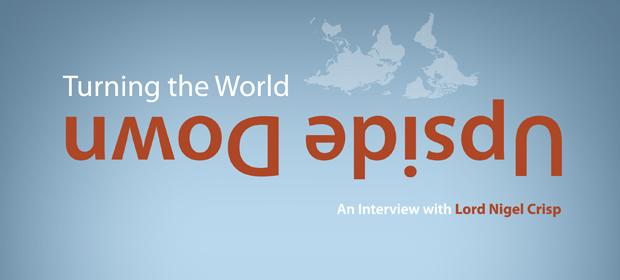Where We Work
See our interactive map


Recently, Lord Nigel Crisp sat down with IntraHealth International’s Laura Hoemeke, director of Strategic Communications, to discuss his latest book, Turning The World Upside Down: the Search for Global Health in The 21st Century.
“When I retired from the National Health Service, Tony Blair asked me if I would look at what more we could do in richer countries to support people working in poorer countries in health—not just with money, but with our experience and expertise. I came back with a report that highlighted two points.
One very obvious and simple point: stop telling people what to do and start listening to what they want to do and help them do it. The second point was that Europe and America [need] to support education and training, because the biggest gap is health workers. We’ve got fantastic traditions in the UK and US of training health workers, so we need to do more of that.
I realized how much we had to learn. I realized that both by what I observed but also from what I saw of Brits working abroad and coming back saying, ‘well, we ought to do that sort of thing in our country.’ People instinctively get this, you know? And you hear people saying things like, ‘actually, the way they deal with the community there, maybe we should be doing that with a community clinic to try and reach some of the poorest people in the UK.’
There was a group in the 16th century called The Levellers; they had a famous tract called ‘The World Turned Upside Down.' It meant getting rid of all hierarchy and everything else—a very revolutionary sort of book. My book slightly refers to that, but only in jest. Turning the world upside down is saying, ‘Let’s look at it the other way around. Why always look at it in the traditional way?’ This is very difficult, because it’s taking off your spectacles—taking off your spectacles inside your head…
Let me give you a wonderful example: task shifting. Can there be anything worse than describing what’s needed in health care in terms of the professions themselves? I remember being in Africa, and an African group said, ‘What is this term task shifting? Send us some doctors and nurses and we’ll shift some tasks to them.’ And what do you think they’ve been doing for years? It cannot be a bunch of Europeans and Americans coming in and defining the world their way… in terms of what fits within the nursing box, the midwifery box, etc.
We should start off saying: this is the world, and these are the problems. Now, who can we get to help? That’s why I use in my book the description ‘train people for the job that needs doing’ and not just for the professions themselves. It is good, of course, to have professions, but not to analyze the world in terms of them. And that’s why task sharing is, to me, a better description.
Make the issues more visible … say these more provocative things and give examples.
Get people to experience [the problems] firsthand … to go and live and work in some of these places. If you are a human being, you start to see and understand instinctively what needs to be done.
Invest in education and training. Change won’t happen in health care unless it happens inside the minds of health workers; we have outsourced our health to health workers. My health is my concern, but I’ve outsourced it to doctors and nurses and allowed them to define and control it.
That’s not a quick fix. And it can only happen one person at a time.”
Lord Crisp served as chief executive of the United Kingdom’s National Health System and Permanent Secretary of the UK Department of Health from 2000 to 2006. In these roles, he led major reforms in the country’s health system. In 2007, he published a special report at the request of Prime Minister Tony Blair, Global health partnerships: the UK contribution to health in developing countries. Following the publication of the report, Crisp co-chaired, with Commissioner Bience Gawanas of the African Union, a taskforce on scaling up the education and training of health workers on behalf of the Global Health Workforce Alliance. Crisp is currently an independent crossbench member of the House of Lords, working primarily on international development and global health.



